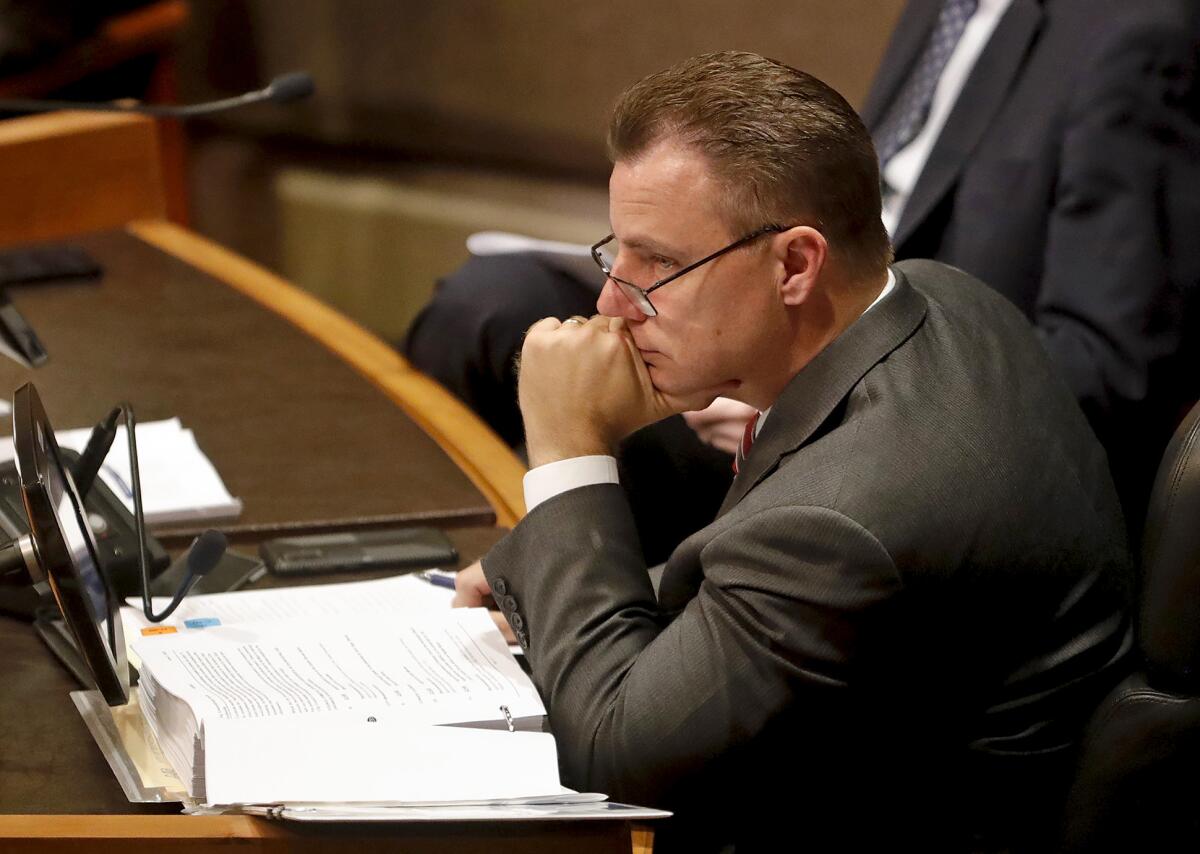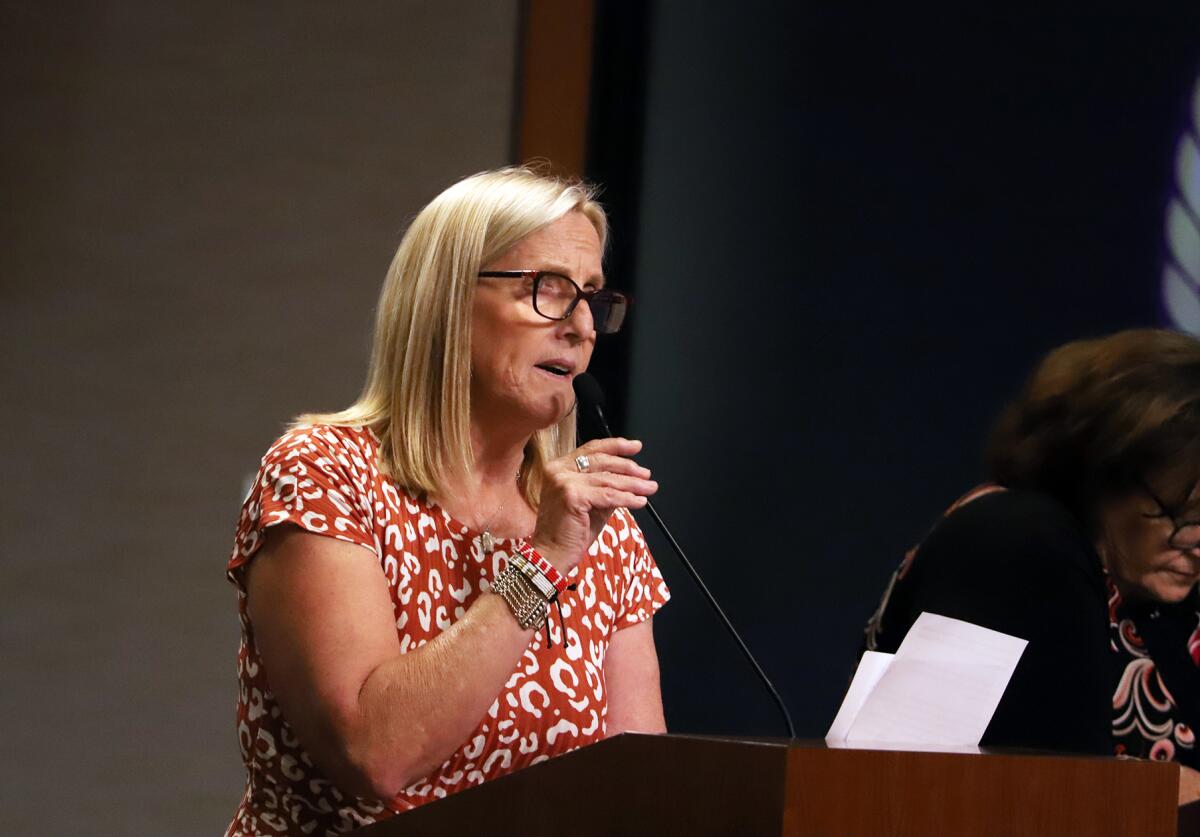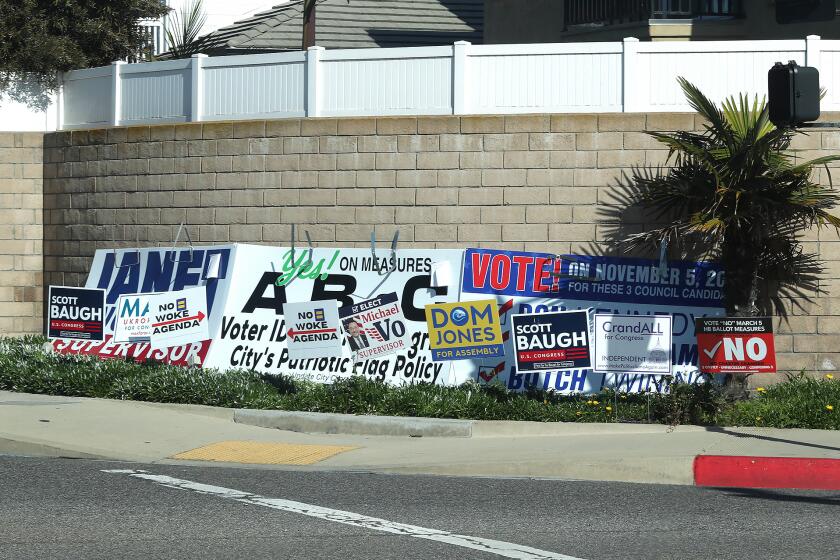Battle over Huntington Beach voter ID measure is one of will, interpretation of law

- Share via
After a warning last September from California’s attorney general and secretary of state that a law allowing Huntington Beach to check voters’ identification in local elections violated state statutes and could incur legal action, the other shoe has dropped.
A lawsuit filed in Orange County Superior Court on Monday claims city leaders overstepped their bounds when they floated amending a section of the city’s charter allowing for the practice in municipal elections. The initiative also stated that, when state and city voting laws conflicted, the latter would prevail.
For the record:
11:32 a.m. April 18, 2024Huntington Beach City Atty. Michael Gates clarified Thursday that when he said he did not know why the mayor’s news conference had been postponed, it was because he’d been in court that day and “wasn’t clear that my attendance at the press conference, at first, was needed.”
That amendment — put before Huntington Beach voters in the March election as Measure A — was approved in a 53.4% vote among the 61,593 ballots cast. State officials are asking for a judicial mandate to stop the law from being implemented in 2026.
“It purports to authorize the city to demand supplemental documentation from registered voters before they cast a ballot, usurping the legislature’s exclusive authority on voter registration,” states the complaint filed by Atty. Gen. Rob Bonta and Secretary of State Shirely N. Weber. “This additional burden on voters cannot be reconciled with state law.”
State officials claim voter identification laws and ballot box monitoring potentially thwart safeguards in California’s election code by creating barriers to participation, particularly for people of color, young and low-income voters, seniors and those eligible to vote who do not have a government-issued photo ID.
Measure A’s backers alternatively claim the law’s provisions protect democracy at the local level.
“It is crucial for our democracy that voters have faith in our election results,” reads an argument penned by Mayor Gracey Van Der Mark and City Atty. Michael Gates in support of the initiative. “That trust in the outcome of elections comes into question when we can’t always be certain who is voting.”
Huntington Beach readies a response
In the wake of Monday’s filing, city officials are circling the wagons to mount a defense and respond to the allegations being made in Sacramento.
Speaking in a statement shared on social media Monday, Gates excoriated the state’s attempt to suppress the wishes of local voters.
“The people of Huntington Beach have made their voices clear on this issue, and the people’s decision on the March 5 ballot measures for election integrity is final,” he said. “To that end, the city will vigorously uphold and defend the will of the people.”
The city attorney was due to appear alongside Mayor Van Der Mark in a news conference hastily set for Tuesday morning and then shortly afterward postponed until Thursday. City public affairs manager Jennifer Carey attributed the delay to a scheduling conflict.
“We obviously wanted the city attorney to be there to speak, and the city attorney had to be in court that day,” she said. “We ended up postponing it so he could be available for questions.”
Gates, however, said in an email Tuesday he did not know if there was any significant reason for the postponement, adding, “it could have simply been a clarification based on availability.” He declined to answer further questions, saying he would provide further comment Thursday.
A battle of preemption
Monday’s lawsuit is the second part of a one-two punch from state leaders against the city’s efforts to impose local election mandates that conflict with California’s election code.
Senate Bill 1174 — introduced by state Sen. Dave Min (D-Irvine) in February and wending its way through the legislative approval process — aims to prohibit local governments from enacting or enforcing voter ID laws, even if a municipal election is held separately from federal, state and county elections. If passed, it would take effect Jan. 1, 2025, nullifying Huntington Beach’s Measure A.
In his initial statement Monday, Gates implied the very existence of SB-1174, a piece of legislation attempting to prohibit an act by local lawmakers, indicates the act itself does not inherently violate the law.
“The Attorney General’s [contention] that the city’s voter ID requirements violate state law is inconsistent with, in fact in direct conflict with, Sen. David Min’s new bill attempting to make Huntington Beach’s voter ID illegal,” he said in the statement.
Gates further cited an article in the California Constitution, referred to as a “home rule” provision, that not only allows charter cities to make and enforce ordinances and regulations in respect to municipal affairs, but makes such laws supreme over laws with which they conflict.
Measures A, B and C would mean changes in the city including the requirement of voter identification for in-person voting.
“The City of Huntington Beach’s voter ID and other election measures approved by the voters on March 5th … are not only permissible, the City’s authority is provided for them in the California Constitution, Article XI, Section 5(b), for local elections,” he said.
In addition to seeking a writ of mandate from a judge to halt Measure A, Weber and Bonta request a judicial ruling to decide whether Article XI, Section 5(b) might be overturned under a provision indicating a charter city’s freedom to enact and enforce municipal laws do not preempt “matters of statewide concern.”
Min responded to Gates’ claim in his own statement Monday, clarifying that “ensuring election integrity in California falls under the authority of the state government, full stop.” He further clarified that while it is already 100% clear that charter cities cannot make rules impacting voters in county, state and federal elections, SB-1174 attempts to extend that to include even municipal elections.
“My reading is that it is not yet decided, and therefore ambiguous whether a charter city could hold its own elections — with its own unique election requirements — at a different time and place from other elections,” he said.
“SB 1174 would clear away any ambiguity and make clear that charter cities could not implement their own voter ID requirements under any circumstances.”
City election official cautioned against Measure A

While the battle between city and state officials begins to ramp up, one Huntington Beach employee in the eye of the storm has her own ideas about the city’s intentions.
Although Huntington Beach City Clerk Robin Estanislau, in her role as the city’s chief elections official, is a named respondent in the lawsuit, she publicly spoke against Measure A, when the initiative was being considered in a council meeting in August.
Estanislau questioned why the city would consider holding an independent election, the full cost of which has yet to be exactly determined, when there are so many safeguards already in place under the county’s Registrar of Voters, which has a solid reputation for processing voter registration, authenticating signatures and certifying election results.
“Why consider local control when we are privileged to consolidate our elections through the county?” she posed. “All, and I repeat all, cities in Orange County do.
“I wonder about liability associated with interfering in our citizens’ right to vote in a legitimate system designed and managed by election experts.”
All the latest on Orange County from Orange County.
Get our free TimesOC newsletter.
You may occasionally receive promotional content from the Daily Pilot.







